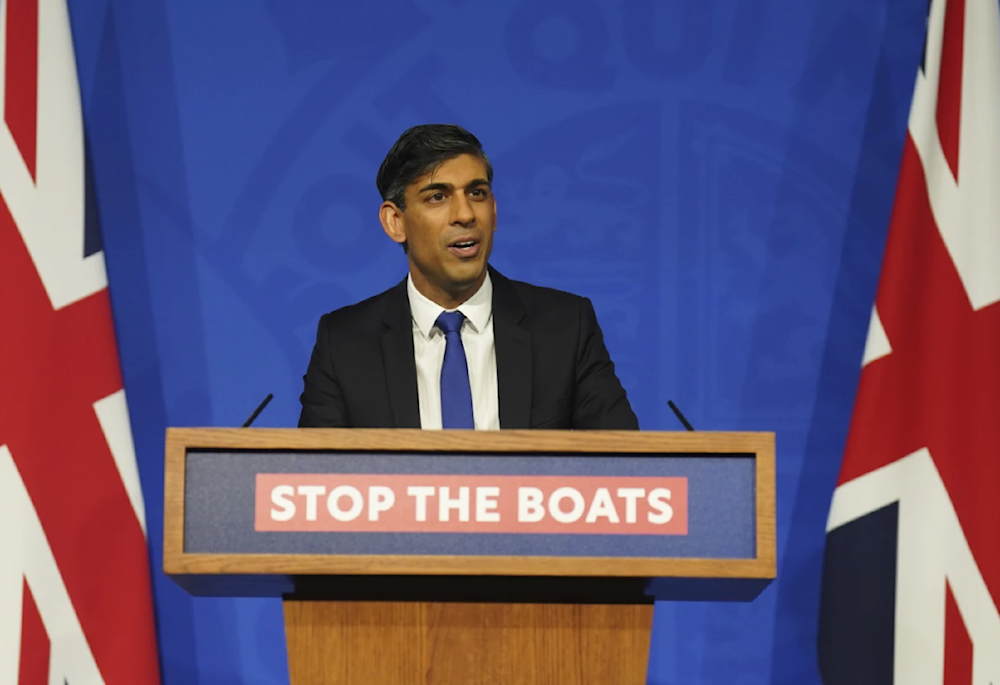UK pays Rwanda $126mln as part of new asylum deal
The money is tied to an enhanced policy to deport irregular migrants to the country, despite not saying so.
-

Britain's Prime Minister Rishi Sunak gives an update on the plan to curb illegal migration during a press conference in London on December 7, 2023. (AP)
Rwanda has received an additional 100 million pounds ($126 million) from the United Kingdom as part of the 2023-24 budget, according to UK Home Office Permanent Secretary Matthew Rycroft, without mentioning that the money is tied to an enhanced policy to deport illegal migrants to the country.
The UK government is making efforts to reduce what it labels as "illegal" migration to the country, which is a highly contentious political issue. There is significant pressure to prevent migrants from undertaking dangerous Channel crossings in small boats.
UK Home Secretary James Cleverly arrived in Rwanda Tuesday to sign a new treaty on cooperation against irregular migration with Rwanda after the UK Supreme Court ruled that the previous draft was unlawful. He emphasized that the African country had neither asked for nor received any more funding for the agreement.
Rycroft wrote in a letter to MPs on Thursday that "ministers have agreed that I can disclose now the payments so far in the 2023-24 financial year. There has been one payment of £100m, paid in April this year as part of the Economic Transformation and Integration Fund [ETIF] mentioned above ... This was entirely separate to the Treaty - The Government of Rwanda did not ask for any payment in order for a Treaty to be signed, nor was any offered."
According to the letter, London paid Kigali 140 million pounds in 2022; yet no migrants were sent to Rwanda that year.
The letter detailed that an extra 50 million pounds will be transferred in the fiscal year 2024-25 "as part of the ETIF as agreed with the Government of Rwanda when the Migration and Economic Development Partnership was signed."
In April 2022, the UK said it reached an agreement with Kagil to send migrants and asylum seekers who cross the Channel thousands of miles away to Rwanda, as the British government tries to reduce the record number of people making the perilous journey. However, no migrants have been sent back so far due to legal controversies after the British government received strong criticism from NGOs and other service unions regarding the legality of the deal.
According to Home Office data obtained through a freedom of information request, between January 2021 and March 2023, 24,083 asylum seekers received letters informing them that they were being considered for forcible removal.
In June, the Court of Appeal in the UK ruled that the UK government's plan to send asylum seekers to Rwanda was unlawful on account that Rwanda could not be considered a safe third country - "unless and until deficiencies" in the African nation's asylum system were amended, "removal of asylum seekers to Rwanda will be unlawful."
"The deficiencies in the asylum system in Rwanda are such that there are substantial grounds for believing that there is a real risk that persons sent to Rwanda will be returned to their home countries, where they faced persecution or other inhumane treatment," the judges said.
The majority of the judges stated that though made in good faith, the evidence presented does not establish that the necessary changes had by then been reliably effected or would have been at the time of the proposed removals.
HRW exposes 'dire' living conditions of asylum-seeking families in UK
Human Rights Watch reported in September that families seeking asylum in the UK are facing inadequate living conditions in government-provided temporary housing. These conditions are negatively impacting their mental and physical health, not to mention their children's access to education.
HRW, in collaboration with the UK human rights group Just Fair, has released a new 100-page report based on joint research. The report reveals that these "dire" living conditions are a result of longstanding policy failures.
The rights organizations reported that they conducted interviews with over 50 asylum seekers, including 27 children, who either lived in temporary housing in England or had recently left such accommodations. According to the report, many of them stated they had spent months in temporary housing, despite the government's alleged target of relocating families to more stable accommodations within 19 days.
The report also pointed out that individuals placed in hotel accommodations faced significant habitability challenges, including limited space, dampness, mold, damaged or missing furniture, and pest infestations. Furthermore, families struggled to provide their children with adequate meals due to the lack of cooking facilities, and children encountered obstacles in accessing education because local schools often did not allow immediate enrollment.
"Inhumane and inadequate housing for people seeking safety is never acceptable, and certainly not in the world's sixth-largest economy," said Yasmine Ahmed, UK director at Human Rights Watch.

 5 Min Read
5 Min Read








